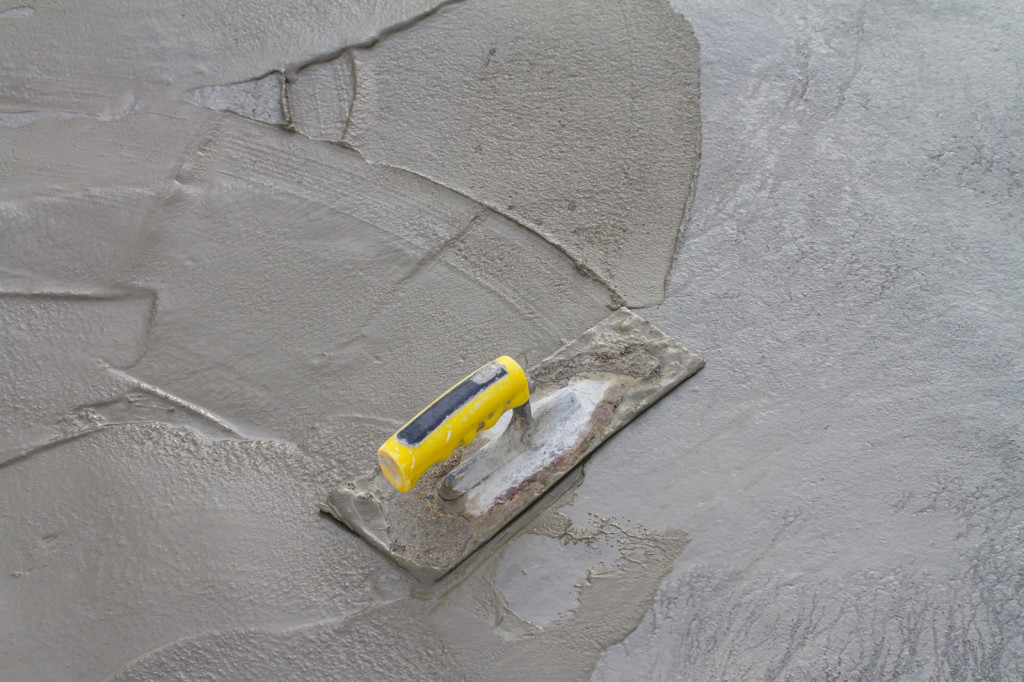
Types Of Residential Foundations
When a new home is built, the choice of foundation system used by the builders depends first and foremost on the condition of the soil. Shallow foundations are fine when they’re built on strong ground; poor soil may call for deeper foundations. Other factors play a role, too. Foundations can be designed to cope with conditions like frequent flooding or freezing temperatures. If you’re looking to build a home of your own, you can talk to a structural engineer to learn more about your foundation choices. We will go over the most common 4 examples of residential concrete foundations in this post.
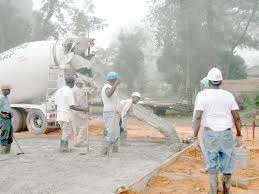 Foundation Type 1: Poured Concrete
Foundation Type 1: Poured Concrete
This is the most common form of residential foundation used today. A concrete slab foundation is exactly what it sounds like: A level mat of concrete a few inches thick with deeper beams around the edges. This is usually placed on a bed of gravel to facilitate drainage. Pouring a concrete slab is fast and straightforward, and this type of foundation works well in climates that do not suffer from deep winter freezes. In most residential jobs, poured concrete foundations will receive a modicum of steel reinforcement to strengthen them.
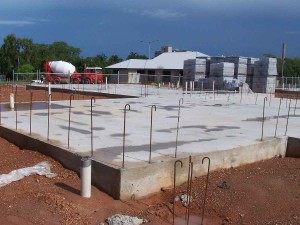 Foundation Type 2: Frost-Resistant Foundation
Foundation Type 2: Frost-Resistant Foundation
In cold climates like those mentioned just above, extra steps are taken to preserve the foundation from temperature extremes. Concrete footings are added to an ordinary slab foundation that extend below the limits of frost penetration. An alternative system is called the frost-protected shallow foundation, or FPSF. In this type of foundation, insulated concrete is used to create a typical slab foundation that will resist frost damage. Frost-protected shallow foundations are most common in the Nordic countries, with millions of examples to be found in Sweden, Norway, and Finland.
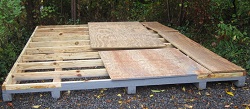 Foundation Type 3: Permanent Wood
Foundation Type 3: Permanent Wood
The technology to create durable, reliable foundations out of wood were perfected in the 60s. Wooden lumber and plywood is specially treated with preservatives to resist moisture and other forms of damage, resulting in a light-weight, high-strength foundation material that can be installed quickly and easily. As an added bonus, permanent wood foundations are easy to insulate, resulting in sub-surface living spaces (basements and crawlspaces) that are more useful. Permanent wood foundations have been used in over 300,000 US homes. Another common use of permanent wood foundations is for constructing sheds.
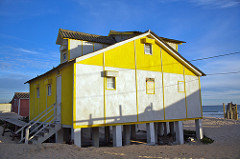 Foundation Type 4: Raised Foundations
Foundation Type 4: Raised Foundations
In coastal areas and other regions that are prone to flooding, raised foundations are the go-to solution. Raised foundations are designed to provide the support a home needs and also to resist moisture. They’re broken down into two main categories: stem wall and pier-and-beam. In both systems, the foundation rests on deep piers anchored in the soil. In pier-and-beam foundations, these piers support individual footings made of masonry which take the load of the home above. In a stem wall foundation, continuous masonry chain walls fill this role instead.
There you go. The most common types of residential concrete foundations. Each one has a specific application that will apply to your project based on the needs your region’s climate and building location impose on you. For help with your next concrete foundation project checkout our residential concrete services or our commercial concrete services or contact us today.
Questions about concrete foundations? Leave us a comment below 🙂
In all honesty, I would probably have to go with the poured concrete. I don’t really know how well wood would stand the test of time against concrete. Plus, you’ll get better durability with stronger structural support.
I live in California, so I’ve not familiar with just how damaging frost can be. I’m surprised that there is a special type of foundation for it. The only residential foundations I’ve seen are the poured concrete and coastal raised foundations. Are there any places in the states that require frost-resistant foundations?
Hi there! This post could not be written any better!
Reading through this article reminds me of my previous roommate!
He continually kept talking about this. I’ll
forward this article to him. Fairly certain he’s going to have a great read.
Thank you for sharing!
Yes! Finally someone writes about try choosing
skin.
Great post! I’m not sure that permanent wood would work for where I live, though—I feel like the damp and the termites would eat right through it! Personally, I’ve only ever seen frost-resistant and poured concrete foundations. Are there any other advantages to raised foundations other than avoiding flood damage? Thanks!
Cal,
This type of design can also be advantageous when building on a steep grade. It can save time and money by avoiding some of the time consuming cuts and fills that would be required to level a pad for a traditional slab.
Great post. I used to be checking continuously this weblog and I am impressed!
Extremely useful info particularly the closing phase :
) I deal with such info a lot. I was looking for this certain information for a
long time. Thanks and best of luck.
I think it is interesting that we use concrete for a number of things. I think it is so interesting how the majority of the buildings we build including our homes have concrete in them. Without it, we really wouldn’t have a firm foundation to build our structures on.
I didn’t know that they make foundations that are actually frost resistant for people who live in cold climates. It is really interesting how many types of foundation choices you have when you construct a new home. I would probably choose concrete for my home, because it sounded like it will be a lot faster than the other choices.
Cool post! Thank you for helping me understand the different types of Residential Foundations! I really liked how you said that,”Foundations can be designed to cope with conditions like frequent flooding or freezing temperatures. If you’re looking to build a home of your own, you can talk to a structural engineer to learn more about your foundation choices.”. I had a really good contractor when I was building my house, and he really helped me to get the best foundation possible to support my new house.
I had no idea that foundations are chosen based on where they are being built. It makes sense that the soil and other things are a huge deciding factor in this process. I’ll have to look into this more when I start building my home at the start of the summer.
Is it only my browser or anyone else too has this strange issues
with viewing the website in firefox?
It’s truly a great and useful piece of info. I am satisfied that you just
shared this helpful info with us. Please keep us
informed like this. Thanks for sharing.
Attractive section of content. I simply stumbled upon your blog and in accession capital to claim that I acquire in fact loved account your blog posts.
Anyway I’ll be subscribing on your feeds or even I fulfillment you get entry to consistently quickly.
Howdy very cool blog!! Guy .. Excellent .. Wonderful
.. I’ll bookmark your site and take the feeds
additionally? I’m happy to search out so many useful information here within the publish, we need
work out extra strategies on this regard, thank you for sharing.
. . . . .
That is cool that there is a frost resistant foundation. We live in a pretty cold area and if we don’t have concrete that can withstand extreme temperatures then it can cause problems. I will have to talk to my contractor about using this. Is this foundation something that most construction workers use normally in really cold areas?
I never knew that wood was used for foundation instead of concrete. I guess with how cheaply it can be done, it does not take that much effort. I will have to see what is the best option for building a house before I actually start anything.
Hurrah, that’s what I was looking for, what a information!
existing here at this web site, thanks admin of this site.
Thanks for the information on these different types of foundations. I think my home has a poured concrete style foundation. It is always good to know what is holding your house up. Thanks for the help, I am sure it will come in handy when I am planning on building another home.
Greetings from Carolina! I’m bored to death at work so I decided
to check out your site on my iphone during lunch break. I love the information you present
here and can’t wait to take a look when I get home. I’m shocked at how fast your
blog loaded on my cell phone .. I’m not even using WIFI,
just 3G .. Anyhow, fantastic blog!
Wonderful work! This is the type of info that are meant to be shared around the internet.
Shame on Google for no longer positioning this submit higher!
Come on over and visit my web site . Thanks =)
Wow, wonderful blog layout! How long have you been blogging for? you made blogging look easy. The overall look of your web site is excellent, as well as the content! kgadedgcfegaddec
I used to be suggested this blog via my cousin. I am no longer
sure whether this post is written through him as no one else recognize such specific approximately my trouble.
You are amazing! Thanks!
I kind of thought that there was no difference in the type of foundation used. It’s cool that there are four types that can be used depending on the project and area you’re working in. I’ve only seen poured concrete while passing construction sites on my way to work.
I didn’t know they still used wood as a foundation type. That seems a little less sturdy. Since we live in a colder area I think that frost resistant foundation would be better for us. I’m not an expert so I’ll ask our future foundation contractors what they think. What foundation do you think is the most sturdy?
Attractive portion of content. I simply stumbled upon your weblog
and in accession capital to claim that I get
actually loved account your blog posts. Anyway I’ll be subscribing
to your feeds and even I success you get admission to persistently rapidly.
You can definitely see your enthusiasm in the
work you write. The world hopes for even more passionate writers like you
who are not afraid to say how they believe. All the time go after your heart.
It’s a joy to find somnoee who can think like that
I seriously love your blog.. Pleasant colors & theme. Did you create this amazing site
yourself? Please reply back as I’m hoping to create my own website and would like to find out where you got this from or
what the theme is named. Thanks!
It’s nearly impossible to find well-informed people for this subject, but you seem lijke you know
what you’re talking about! Thanks
If you desire to grow your know-how only keep visiting this web site and be updated with
the newest gossip posted here.
I’m hoping to buy my first home in the next few years. I’m trying to learn as much about homes as possible. Thanks for letting me know about the four types of foundations that homes can have: poured concrete, frost resistant concrete, permanent wood, and raised foundations. It sounds like if you live in an area that can have some harsh winters having a frost resistant foundation can help reduce potential repairs and services that will be needed. I’ll keep that in mind as I start shopping around. Thanks.
It is in reality a nice and useful piece of info.
I am glad that you just shared this helpful info with us.
Please stay us informed like this. Thank you for sharing.
Its interesting hearing about FPSF, I did not know that frost could be so destructive if you do not take the right per cautions. That is when I got really interested in hearing and learning about insulated concrete. I would love to hear more about that. How is that slab of cement differ from the other slabs in order to create insulation?
I didn’t know that there were so many different types of foundation types. I thought that we all did the same slab of concrete and left it at that. I didn’t know that people still used wood as their foundation. I guess that it would make a lot of sense to have the right type of foundation for the home’s location.
We are hoping to build a new home soon and are just starting the planning process. I didn’t know that there were different types of foundations that we could use. Concrete sound like it will be the best option for out situation. Are there certain types of foundations that are required in certain locations? Thanks for this information!
“A round of applause for your blog post.Thanks Again. Will read on…”
Thanks for the post. This is really helpful to understanding the different types of foundations. I think they all have their benefits depending on where you live. I agree that poured concrete is the most common type of foundation. I think it is probably the best options for most situations.
My husband wanted to know more about different concrete types. It makes sense to think that the choice of concrete depends on the condition of the soil. Our climate and soil permit the traditional poured concrete foundation which happens to be the foundation of our house. Good to know more about this topic, thanks.
Hey, thanks for the post.Really looking forward to read more. Really Cool.
I believe this really is among the most important info in my opinion. And i’m glad reading your article.
But wish to remark on some general things, The site style is
ideal, the articles is really nice : D. Good job, cheers
I think that raised concrete foundation is pretty interesting. It looks like it can be kind of tricky to build. Though it’s pretty awesome that it provides protection in areas where flooding is more common.
I could not resist commenting. Perfectly written!
Hi! I could have sworn I’ve gone to this blog before but after reading through a few of the post I realized it’s a novice to me.
Anyways, I’m definitely glad I found it and I’ll be bookmarking and checking back frequently!
An fascinating dialogue is price comment. I feel that it is best to write more on this topic, it might not be a taboo topic however usually people are not enough to talk on such topics. To the next. Cheers
Good day! I just would like to give a huge thumbs up for the good info you’ve got here on this post. I will likely be coming again to your weblog for extra soon.
VZ
Hi there, I enjoy reading through your article. I wanted to
write down a bit comment to support you.